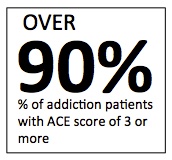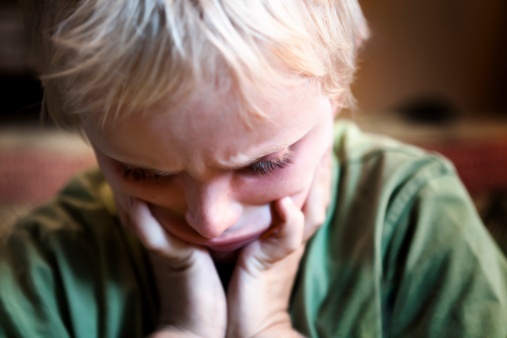
Are drugs really the issue when it comes to addiction, or does the root cause go much deeper?
If you’re struggling with addiction, is there a need to take a look at your childhood experiences, and how they might contribute to your substance abuse in adulthood?
A growing body of research says yes. There is a significant link between adverse childhood experiences (ACEs) and addiction.
Dr. Daniel Sumrok, director of the Center for Addiction Sciences at the University of Tennessee Health Science Center’s College of Medicine, says addiction shouldn't be called "addiction." He says it should be called "ritualized compulsive comfort-seeking."
Addiction shouldn't be called "addiction." It should be called "ritualized compulsive comfort-seeking."
“After I explain [that addiction is a coping behavior that people employ in the absence of healthier alternative], many of them stare at me and say: ‘You mean I’m not crazy?’” I tell them, ‘No, you’re not crazy’,” says Dr. Sumrok.
Consider this: What you’ve thought of as your “crazy” addiction might actually be a very sane response to a high level of psychological trauma and distress.
According to SAMHSA, (Substance Abuse and Mental Health Administration), every adverse childhood experience “increases the likelihood of early initiation into illicit drug use by 2- to 4-fold.”
In other words, going through adverse childhood experiences not only ups your chance of abusing drugs, but also your chance of abusing them earlier in life.
But if that’s the case, does that mean that people with tough childhoods are doomed?
Quite the contrary.
What are Adverse Childhood Experiences?
Adverse childhood experiences are also known as ACEs. A major study conducted by the Center for Disease Control and Prevention (CDC) and Kaiser Permanente looked at the impact of adverse childhood experiences on a whole host of medical and mental health conditions.The researchers broke down these adverse childhood experiences into three different categories:
- Abuse
Abuse includes physical abuse, sexual abuse, mental abuse, emotional abuse, and even spiritual abuse. The researchers focused on physical, sexual, and mental/emotional abuse. - Neglect
Neglect can also happen on levels, but the researchers primarily looked at physical neglect and emotional neglect. Examples of physical neglect would be: your parents don't give you healthy food, or they don't provide enough clothing for you, or they don't take you to the doctor. Emotional neglect occurs when they don't express love for you; they don't hold you; they don't nurture you. - Household Dysfunction
This encompasses a wide variety of events, including divorce, having a family member with a substance abuse issue, and having a family member with untreated mental illness, especially depression. You might also have a family member in prison; that’s considered household dysfunction.
The Link Between Adverse Childhood Experiences and Addiction
The researchers found a strong link between the number of ACEs and significant health issues in adulthood, including addiction and substance abuse. The more ACEs that you have, the higher the likelihood that you might struggle with addiction issues later in your lifetime.  According to Dr. Sumrok, “I’ve seen about 1,200 patients who are addicted. Of those, more than 1,100 have an ACE score of 3 or more.”
According to Dr. Sumrok, “I’ve seen about 1,200 patients who are addicted. Of those, more than 1,100 have an ACE score of 3 or more.”
Addiction is not the only experience that's correlated with ACEs.
Mental health conditions, such as depression and hopelessness, are related to adverse childhood experiences as well.
Suicide attempts are also highly correlated with ACEs, as are obesity and heart disease.
But just because you've had a childhood trauma does not mean that your destiny is set in stone.
Yes, there are a higher proportion of people who have these childhood trauma and later develop addictions and these health issues … but there are also plenty of people who have these really challenging experiences and go on to have incredibly rich, productive and healthy lives.
Learn more about psychosocial development in early childhood here.
Find Out if ACEs Are an Issue For You
How do you know how many adverse childhood experiences you have? What number of ACEs is statistically significant? Have you had experiences that seemed "normal" at the time, but you later realized were deeply dysfunctional, neglectful, or abusive?
To find the answers, take the short, 10 question quiz and review the facts with our blog post Do You Have Adverse Childhood Experiences? Take The Quiz.
The quiz is an abridged version of the one used in the landmark Center for Disease Control and Prevention (CDC) / Kaiser Permanente study.
Knowing your score will help you to discover how your childhood dysfunction may be impacting your adult life.
Take the ACE Quiz
How To Move Forward From ACEs
You may have been dealt a very difficult hand in your childhood, and that shouldn’t be minimized. Life might have been very hard for you; it might have set you up for struggle.
But you are the one who gets to create your life.
You may have been dealt this difficult hand, but you get to choose how you play that hand.
Consider the card game analogy: if you are a really strong poker player, you can take what looks like a terrible hand and you can win the table depending on the other things that you do. You can use your other skills, such as bluffing. There are still a lot of ways to still win even if you have been dealt a challenging hand.
A Powerful Technique to Heal from Adverse Childhood Experiences
As one of the best non 12 step rehabs in the northwest, we teach that when we apply love to the parts of ourselves that hurt, we heal.
Often our adverse childhood experiences are like signposts, pointing out the parts of us that still hurt.
Maybe it's the part of us that still hurts from our parents getting divorced; maybe that shook up our world and made us feel like we couldn't trust anybody.  Maybe it's the part of us that was emotionally abused by our parent or sibling, and we feel small and scared.
Maybe it's the part of us that was emotionally abused by our parent or sibling, and we feel small and scared.
Maybe we have a bully in our heads that sounds like the bully that we had in real life.
Whatever the trauma might have been, now we’re trying to numb that pain with drinking or drugs or compulsive behavior. Even though the experience is over, that pain is still with us.
So that's what we work on in our non 12-step program: healing those parts of ourselves that hurt.
When we tend to those hurting parts of ourselves, then the compulsions and the addictions drop away. Those addictions were attempts to manage the pain and the discomfort that arose from those adverse experiences. So if we heal the pain - if we heal that underlying core issue, then we don't need to check out. When we've healed the underlying core issue, we don't need to gamble or over-exercise or use drugs or anything like that.
A lot of people ask us, "How do you do that, though? How do you apply love to the parts of yourself that hurt? We never learned that in school!"
And typically, that’s true.
This process is something that does not get taught to most of us early in our lives. There are myriad techniques that we use to help apply love to the parts of yourself that hurt. One of the ones that you can try today is called Opposite-Hand Writing.
How to Do Opposite-Hand Writing
The whole idea with this exercise is that you're holding a loving space. So before you start it, you get centered, you get peaceful, and you hold this space for the younger part of you.
Then you start a conversation by using your dominant hand.
Write, "Hi. How are you? What's going on for you?"
And then you answer with your non-dominant hand, tapping into the younger and more childlike part of yourself.
You may be very surprised what can come up from that younger part of you!
Carry on this dialogue, reparenting the younger part of yourself. Offer love; offer encouragement. Don't judge and don't criticize.
We go into more detailed step-by-step instructions for exactly how to do this, and this is just one of many techniques. Yet we offer it to you today because it's something that is very accessible; you can do it right here and now. It can break through a lot of the walls that you may have put up around the part of yourself that went through those traumas. Working with your non-dominant hand engages different parts of your brain, so it can help you to get past a lot of those mental blocks that you've put up.
Getting Additional Help with ACEs
If you have more questions about ACEs, check out our Adverse Childhood Experiences FAQs.
If you're dealing with several adverse childhood experiences, seek a professional counselor.
When you're able to tap into that healthy therapeutic bond, it can help to heal and overcome a whole host of issues.

"While the unit of physical survival is one, the unit of psychological survival is two." says psychologist Judith Herman
The flip side of that quote is that when we do have a safe person - when we have someone who can work with us and help us to heal these emotional hurts that we've been carrying around - then we can survive, and even thrive.
Despite the really tough things that have happened to us as children, we have the power to heal our lives from here on out.
Healing Root Issues of Addiction
Adverse childhood experiences often are the underlying core issues of coping behaviors, including addictions. To learn more about healing these issues, download our free eBook:



